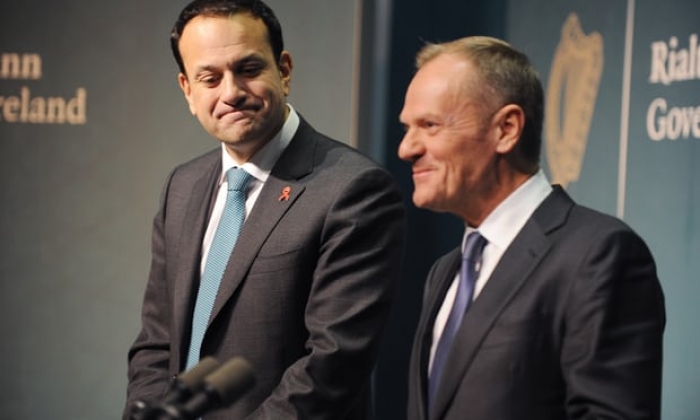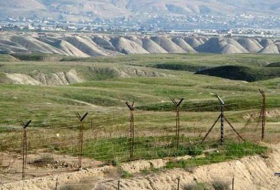He warned that progress would not be possible if the taoiseach, Leo Varadkar, was not satisfied with the UK’s offer on the Irish border, which is scheduled to be tabled in Brussels on Monday.
Ireland, which is looking for written commitment that there will be no return to a hard border with Northern Ireland, has threatened to veto progress if Britain does not come up with a satisfactory and firm offer this weekend.
“Let me say very clearly: if the UK offer is unacceptable for Ireland, it will also be unacceptable for the EU. I realise that for some British politicians this may be hard to understand,” said Tusk.
It was “logic” that the EU would support Ireland before a member state that was leaving the bloc. “This is why the key to the UK’s future lies – in some ways – in Dublin, at least as long as Brexit negotiations continue,” the council president said.
Speaking in Irish Gaelic, Tusk made clear that the EU stood full square behind Ireland: “Ní neart go cur le chéile” [There is no strength without unity].
His words were an indication of clear and unambiguous support from the EU as Monday’s deadline for an offer on the Irish border, the divorce bill and EU citizens’ rights closes in, placing relations between the EU27 and the UK on a knife edge.
Earlier on Friday, Ireland’s deputy taoiseach and foreign minister, said he believed a Brexit deal on the Irish border question was “doable”, and confirmed that his government had held talks on the subject with Northern Ireland’s Democratic Unionist party.
Simon Coveney said a breakthrough was possible before Theresa May’s crunch meeting with Jean-Claude Juncker, the European commission president, on Monday.
“I think it is doable ... We are not where we need to be today, but I think it is possible to get to be where we need to be in the next few days,” he said.
After what some in Ireland have dubbed “gunboat diplomacy” by the DUP, Coveney moved to calm the storm.
“We can work through this. We want to listen to unionism. They are of equal importance, but at the same time we can’t allow one party to dictate what is acceptable and what is not,” he said.
His comments follow accusations by the DUP MP Ian Paisley Jr that Ireland had acted disgracefully in demanding Northern Ireland have separate legal status to the rest of the UK.
But Coveney warned that Ireland would remain stubbornly firm on the issue of the hard border and was prepared to pull the plug on the Brexit talks.
“There is not an anti-British bone in my body. Britain is a great country and we want a good deal. A good deal for Britain is a good deal for us, but Ireland will not be steamrolled on this issue,” he said.
EU Brexit taskforce officials have been working intensely with British officials over the past few days, but Dublin said it had not seen any wording.
Varadkar said he was an optimist, adding : “[We are prepared to continue] the intensive work with the taskforce that is negotiating for the EU27 to secure a positive outcome, allowing us to move on to talks about transition and the future relationship between the UK and the EU.”
The last-minute meeting between Tusk and Varadkar ended a week of heightened tensions between Ireland and unionists in Northern Ireland, who see the Republic’s position as a threat to the UK and a step on the path to a united Ireland.
On Thursday the DUP threatened to pull the plug on its £1bn deal propping up the Conservatives if May offered any deal that would decouple Northern Ireland from the rest of the UK.
Tusk said he had agreed that Varadkar would be consulted fully before the guidelines for negotiations on Brexit transition arrangements were circulated among the 27 member states before the council summit on 14 December.
There, the states will decide formally whether or not the “sufficient progress” test will be met on three issues: the financial settlement, EU citizens’ rights and the Irish border.
More about: #Brexit















































